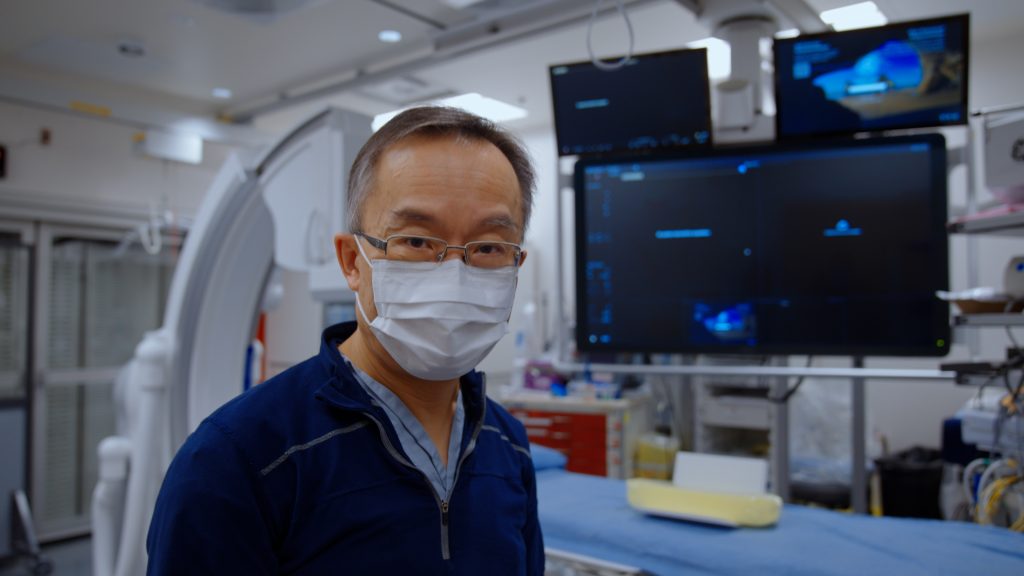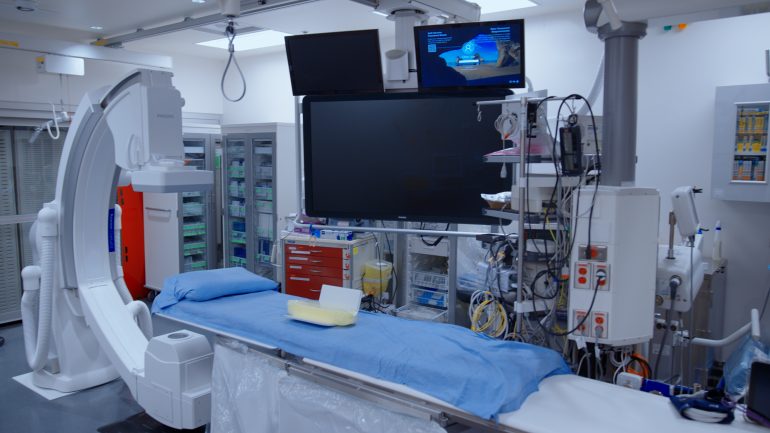More than 6,000 people are admitted to Fraser Health hospitals for cardiac failure every year. As part of a regional strategy to expand cardiac care, a new cardiac multipurpose interventional suite at Royal Columbian Hospital is now open to provide better access to specialized cardiac procedures. Additionally, a governance structure is in place and project plans are being developed for two new cardiac catheterization (cath) labs at Surrey Memorial Hospital to further enhance access to this important service. The cath labs at Surrey Memorial Hospital will be co-located with a new interventional radiology suite.
The new cardiac multipurpose interventional suite at Royal Columbian Hospital enables health teams to perform specialized procedures, including minimally invasive procedures which improve and save lives. Early diagnosis and timely treatment of cardiac disease, including coronary, valve and electrical disturbances can prevent serious complications including stroke and cardiac arrest.
“With an aging population, we are seeing more patients who require cardiac procedures who may not be suitable for conventional surgery,” says Dr. Albert Chan, director, Cardiac Catheterization Lab. “Being able to provide even more minimally invasive procedures in a third procedure room is a huge benefit to our community. It allows our patients to have a shorter recovery and return to their normal activities much quicker.”

”The new multi-use space give us more flexibility to meet the needs of patients,” says Samina Patel, clinical nurse educator. “It is incredibly rewarding to improve people’s lives by being able to diagnose and treat their cardiac issues.”
Among other things, the multipurpose interventional suite will be used for mapping the circuits of the heart (electrophysiology), and implanting devices such as pacemakers and defibrillators. Demand for these services is growing.
A relatively new procedure, Transcatheter Edge-to-Edge-Repair (TEER), is designed for patients with valve problems and congestive heart failure for whom open heart surgery is not an option. TEER involves inserting a clip through a plastic tube from the femoral vein in the groin up to the left side of the heart. The clip holds the edges of the mitral valve together, allowing the valve to open and close properly, preventing blood from flowing back into the left side of the heart.
The demand for Electrophysiology (EP) procedures also continues to grow. An estimated 1,015 EP procedures will be completed in 2024/2025, including atrial fibrillation (AF) ablation procedures. When the electrical impulses that coordinate contractions of the heart are out of sync, atrial fibrillation results. AF ablation can correct this problem with significant improvement in outcomes and quality of life.
“Often, the need for medication goes away completely,” says Shawn Muirhead, electrophysiology clinical coordinator. “We see people get back to riding bikes and walking because they received care that literally adds years onto their lives.”
Heart disease remains a primary cause of death among people 65 and older. We know that in the coming years, our communities will continue to grow, resulting in an increased demand for cardiac services, including general cardiology, diagnostics and interventions, surgery and inpatient capacity, outpatient clinics and outreach services.
“Expanding our services and physical spaces and infrastructure when patients are present and receiving life-saving procedures is a challenge and an honour,” says Sharat Chandra, Vice President, Strategic Capital Investments and Facilities. “The Facilities project planning, design, construction and maintenance teams had to be nimble in order to respond to the challenges posed by COVID-19 while creating the new space, equipment and functionality as quickly as possible. The new suite is a testament to the collaboration between clinical and Facilities Management providing physical spaces that are vital to patient care.”
In recognition of the importance of heart health, Royal Columbian Hospital Foundation funded more than $1.6 million of the $12.6 million renovation to the cardiac catheterization lab.
“Royal Columbian Hospital Foundation is incredibly grateful for the support of our generous donors who have helped to make this possible. Their contributions enable us to provide patients across B.C. with the highest quality of care,” says Jeff Norris, President and CEO. “We are committed to continuing our mission of supporting Royal Columbian Hospital and improving health care outcomes for all those in need across our province.”
Photo courtesy Fraser Health: Dr. Stanley Tung, cardiac electrophysiologist, Royal Columbian Hospital.





